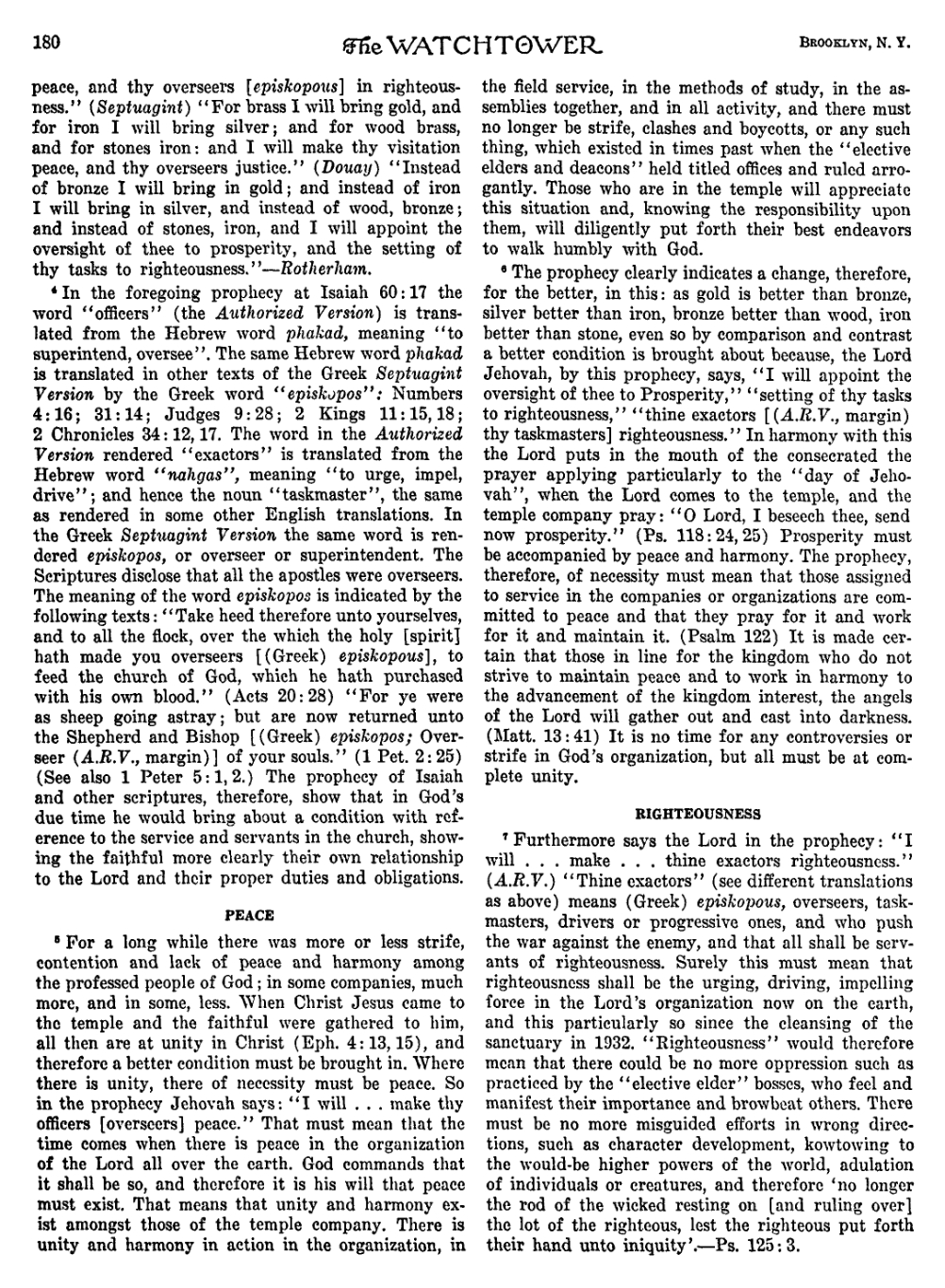180
peace, and thy overseers [episkopous] in righteous-
ness.’’ (Septuagint) ‘‘For brass I will bring gold, and
for iron I will bring silver; and for wood brass,
and for stones iron: and I will make thy visitation
peace, and thy overseers justice.’’ (Douay) ‘‘Instead
of bronze I will bring in gold; and instead of iron
I will bring in silver, and instead of wood, bronze;
and instead of stones, iron, and I will appoint the
oversight of thee to prosperity, and the setting of
thy tasks to righteousness.’’—Rotherham.
In the foregoing prophecy at Isaiah 60:17 the
word ‘‘officers’’ (the Authorized Version) is trans-
lated from the Hebrew word phakad, meaning ‘‘to
superintend, oversee’’. The same Hebrew word phakad
is translated in other texts of the Greek Septuagint
Version by the Greek word ‘‘episkupos’’: Numbers
4:16; 31:14; Judges 9:28; 2 Kings 11:15, 18;
2 Chronicles 34: 12,17. The word in the Authorized
Version rendered ‘‘exactors’’ is translated from the
Hebrew word ‘‘nahgas’’, meaning ‘‘to urge, impel,
drive’’; and hence the noun ‘‘taskmaster’’, the same
as rendered in some other English translations. In
the Greek Septuagint Version the same word is ren-
dered episkopos, or overseer or superintendent. The
Seriptures disclose that all the apostles were overseers.
The meaning of the word episkopos is indicated by the
following texts : ‘‘Take heed therefore unto yourselves,
and to all the flock, over the which the holy [spirit]
hath made you overseers [(Greek) episkopous], to
feed the church of God, which he hath purchased
with his own blood.’’ (Acts 20:28) ‘‘For ye were
as sheep going astray; but are now returned unto
the Shepherd and Bishop [(Greek) episkopos; Over-
seer (A.R.V., margin) ] of your souls.’’ (1 Pet. 2: 25)
(See also 1 Peter 5:1,2.) The prophecy of Isaiah
and other scriptures, therefore, show that in God’s
due time he would bring about a condition with ref-
erence to the service and servants in the church, show-
ing the faithful more clearly their own relationship
to the Lord and their proper duties and obligations.
PEACE
- For a long while there was more or less strife,
contention and lack of peace and harmony among the professed people of God ; in some companies, much More, and in some, less. When Christ Jesus came to the temple and the faithful were gathered to him, all then are at unity in Christ (Eph. 4:13, 15), and therefore a better condition must be brought in. Where there is unity, there of necessity must be peace. So in the prophecy Jehovah says: ‘‘I will... make thy officers [overscers] peace.’’? That must mean that the time comes when there is peace in the organization of the Lord all over the earth. God commands that it shall be so, and therefore it is his will that peace must exist. That means that unity and harmony ex- ist amongst those of the temple company. There is unity and harmony in action in the organization, in She WATCHTOWER. BROOELYN, N. Y. the field service, in the methods of study, in the as- semblies together, and in all activity, and there must no longer be strife, clashes and boycotts, or any such thing, which existed in times past when the ‘‘elective elders and deacons’’ held titled offices and ruled arro- gantly. Those who are in the temple will appreciate this situation and, knowing the responsibility upon them, will diligently put forth their best endeavors to walk humbly with God. ® The prophecy clearly indicates a change, therefore, for the better, in this: as gold is better than bronze, silver better than iron, bronze better than wood, iron better than stone, even so by comparison and contrast a better condition is brought about because, the Lord Jehovah, by this prophecy, says, ‘‘I will appoint the oversight of thee to Prosperity,’’ ‘‘setting of thy tasks to righteousness,’’ ‘‘thine exactors [(A.2.V., margin) thy taskmasters] righteousness.’’ In harmony with this the Lord puts in the mouth of the consecrated the prayer applying particularly to the ‘‘day of Jeho- vah’’, when the Lord comes to the temple, and the temple company pray: ‘‘O Lord, I beseech thee, send now prosperity.’’ (Ps, 118: 24,25) Prosperity must be accompanied by peace and harmony. The prophecy, therefore, of necessity must mean that those assigned to service in the companies or organizations are com- mitted to peace and that they pray for it and work for it and maintain it. (Psalm 122) It is made cer- tain that those in line for the kingdom who do not strive to maintain peace and to work in harmony to the advancement of the kingdom interest, the angels of the Lord will gather out and cast into darkness. (Matt. 13:41) It is no time for any controversies or strife in God’s organization, but all must be at com- plete unity. RIGHTEOUSNESS 7 Furthermore says the Lord in the prophecy: ‘‘I will ... make... thine exactors righteousness.”’ (A.R.V.) ‘Thine exactors’’ (see different translations as above) means (Greek) episkopous, overseers, task- masters, drivers or progressive ones, and who push the war against the enemy, and that all shall be serv- ants of righteousness. Surely this must mean that righteousness shall be the urging, driving, impelling force in the Lord’s organization now on the earth, and this particularly so since the cleansing of the sanctuary in 1932, ‘‘Righteousness’’ would therefore mean that there could be no more oppression such as practiced by the ‘‘elective elder’’ bosses, who feel and manifest their importance and browbeat others. There must be no more misguided efforts in wrong direc- tions, such as character development, kowtowing to the would-be higher powers of the world, adulation of individuals or creatures, and therefore ‘no longer the rod of the wicked resting on [and ruling over] the lot of the righteous, lest the righteous put forth their hand unto iniquity’—Ps. 125: 3.
